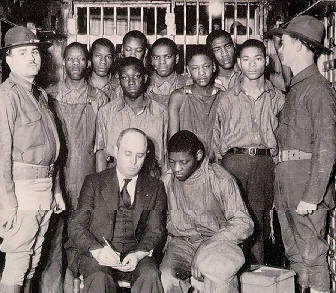
Ninety-three years ago today, nine Black teenagers, “hoboing” on a freight train between Chattanooga and Memphis, Tennessee, were attacked by a mob of white youths who strongly disapproved of their presence on “a white man’s train.” Thrown off it by their intended victims, the hooligans falsely reported to police in Paint Rock, Alabama, that the teenagers has attacked them. After a search of the train, the police rounded up not only the Black youths but also two white women who then falsely accused them of rape. The prosecution of “The Scottsboro Boys,” the first international cause célèbre of the American Civil Rights Movement, afforded an opportunity for the Communist Party to leave its mark, the first of many, on that movement. This complex historical episode eventually became the subject of academic study, and one of the first scholars to study it was my friend and fellow Aptheker research assistant, Hugh Murray. [1]

On that very day, March 25, 1931, Otis Q. Sellers turned 30. He was not yet the grey eminence I knew in the 197os, but the young man finally out of his twenties and on his way to becoming the Bible teacher from whom I learned much. About his life and thought I’ve been blogging into existence, for the past six years, a 96,000-word manuscript. (I’m raising funds to publish it as a book, I hope this year.) Two years into the Great Depression, Sellers was in the middle of his stint (1928-1932) as pastor of Fifth Avenue Baptist Church in Newport, Kentucky, which he left (to shorten a long story brutally) “to do my own studies.” On his milestone birthday, what was transpiring 400 miles south of him was on the mind of few Americans, and his wasn’t one of them. That would soon change.
Continue reading “Otis Q. Sellers, the Scottboro Boys, and me”
